 Petzlover
Petzlover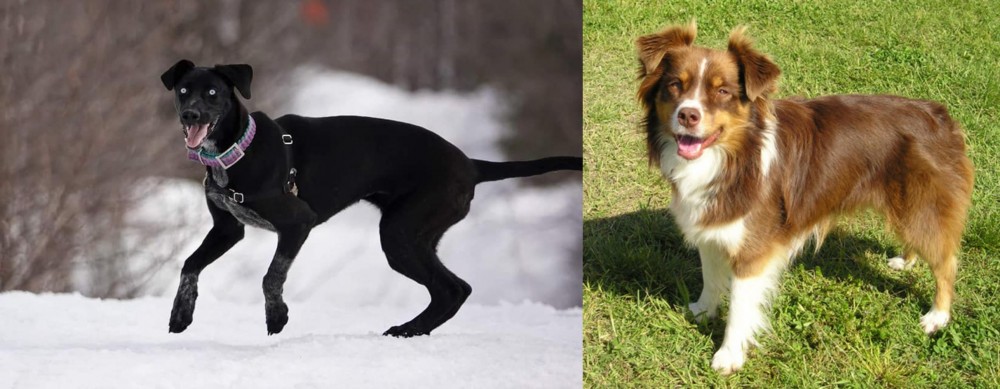 Eurohound is originated from Norway but Miniature Australian Shepherd is originated from United States. Eurohound may grow 26 cm / 11 inches higher than Miniature Australian Shepherd. Eurohound may weigh 8 kg / 18 pounds more than Miniature Australian Shepherd. Both Eurohound and Miniature Australian Shepherd has almost same life span. Both Eurohound and Miniature Australian Shepherd has almost same litter size. Eurohound requires Low Maintenance. But Miniature Australian Shepherd requires Moderate Maintenance
Eurohound is originated from Norway but Miniature Australian Shepherd is originated from United States. Eurohound may grow 26 cm / 11 inches higher than Miniature Australian Shepherd. Eurohound may weigh 8 kg / 18 pounds more than Miniature Australian Shepherd. Both Eurohound and Miniature Australian Shepherd has almost same life span. Both Eurohound and Miniature Australian Shepherd has almost same litter size. Eurohound requires Low Maintenance. But Miniature Australian Shepherd requires Moderate Maintenance
 Sled dog racers wanted something unique and hardy in their dogs and the Eurohound seemed to be the dog that fitted the bill.
Sled dog racers wanted something unique and hardy in their dogs and the Eurohound seemed to be the dog that fitted the bill.
It was in the 1980s that both Norway and Sweden started crossing the Husky and the Pointer for the first time.
The Eurohound, known also as the Scandinavian hound, is a cross between a German Shorthaired Pointer and an Alaskan Husky as well as other Pointer dogs.
Hailing from Norway, Scandinavia, it isn’t a purebred dog but a cross-breed, and the term ‘Eurohound’ comes from a certain Ivana Nolke so as to distinguish the European racing dogs imported into Alaska.
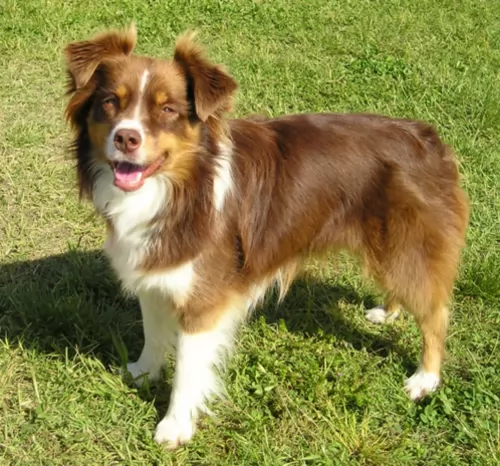 Unlike some miniaturized pure dog breeds, the Miniature Australian Shepherd is a breed of its own. The American Kennel Club and the United Kennel Club recognize that the miniature Australian Shepherd is the same as the miniature American Shepherd.
Unlike some miniaturized pure dog breeds, the Miniature Australian Shepherd is a breed of its own. The American Kennel Club and the United Kennel Club recognize that the miniature Australian Shepherd is the same as the miniature American Shepherd.
Certain breeding programs to develop the Miniature Australian Shepherd have been established and this dog is a small version of the Australian Shepherd. You can say that the Mini Australian Shepherd was developed in the 1960s and hails from the USA. American ranchers bred small Australian Shepherd dogs to create smaller replicas of the breed.
 The Eurohound is a carefully bred dog considered to be a large dog standing up to 72 cm in height and weighting in the region of 18-24 kg.
The Eurohound is a carefully bred dog considered to be a large dog standing up to 72 cm in height and weighting in the region of 18-24 kg.
With its mission being to be a sled dog, it is constantly being crossbred with other cross- breeds to produce dogs to suit the pulling of sleds. Because both the Husky and Pointers have been used in its breeding, who knows really how its appearance will be as it can vary quite a bit.
There are however, some common features in the dogs such as the half dropped ears. More Eurohounds have black ears with white markings. The dog is a slender breed with a longish face and a long muzzle. Certainly it is known for being a powerful sled dog. The short, shiny dog can be in a number of colors such as cream, beige white, red, black, spotted or patched.
Social, extrovert and energetic, the Eurohound also loves to be busy. Its a dog who forms a strong relationship with its owners, being affectionate and loyal. While he is quite able to live in the city or the country, he essentially needs large premises as he loves to run and be free.
He most certainly isn’t a working dog breed who can be left on his own in the backyard until you need him to pull a sled as he craves your companionship. He is an independent and stubborn dog and therefore training and socialization will b excellent for him as it makes him understand who is boss in the home.
He is a dog who gets on well with other pets in the home as well as children.
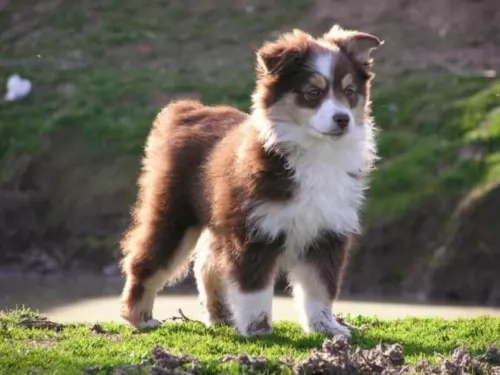 The Miniature Australian Shepherd’s coat is medium-length and is straight or wavy. It comes in a range of colors such as blue or red merle and red or black tricolor. There are white or tan markings as well. He is a small dog, standing at 33 - 46 cm in height and weighing 6 – 16kg.
The Miniature Australian Shepherd’s coat is medium-length and is straight or wavy. It comes in a range of colors such as blue or red merle and red or black tricolor. There are white or tan markings as well. He is a small dog, standing at 33 - 46 cm in height and weighing 6 – 16kg.
They have blue or brown eyes but some will even have one eye blue and the other brown. The ears are semi erect, semi floppy and the tail, while essentially left long and feathery, is sometimes docked.
Miniature Australian Shepherds are easygoing dogs who love being with their human families. They get on well with children in the home and are always willing to jump right in for a game.
They’re lively and agile and if its not games they’re busy with, they want to be on a walk. They’re loving and loyal and also eager to please, sensing what their owner wants.
They’re intelligent dogs too and easy to train so it is sure to go well with training and socialization, which is important for any dog. This training and socialization can actually help with problems a dog has such as being very nervous or being too active indoors. They become obedient and manageable wherever they are.
He is also willing to get on with other pets in the house. Just like the larger dog, the mini Australian Shepherd loves to be active and at work.
 Full of bounce, social and extroverted, while also being independent and stubborn, the Eurohound just loves being around his human family, bonding strongly with them, whether they are adults, children or even other pets in the home.
Full of bounce, social and extroverted, while also being independent and stubborn, the Eurohound just loves being around his human family, bonding strongly with them, whether they are adults, children or even other pets in the home.
You’ll find that your Eurohound is an intelligent dog too and that he can be easily trained. He loves to be active, so to put him in your backyard and all but forget about him would be cruel. They are loyal, loving dogs who want to be part of all your activities, being ready to walk and run with you whenever the opportunity arises.
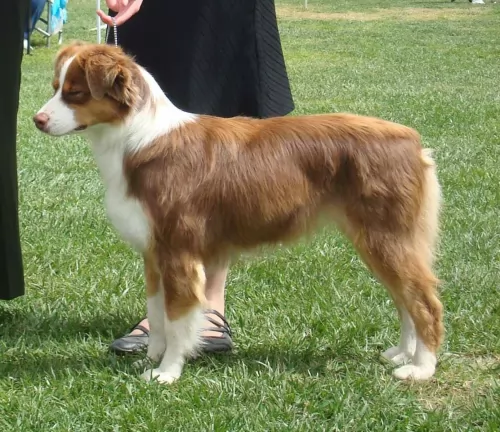 The wonderful friendly nature’s of these dogs make them excellent family pets, especially when they have been trained and socialized. They can live in the city or country but they will certainly require being exercised as they are an active breed, wanting to be busy with his human family.
The wonderful friendly nature’s of these dogs make them excellent family pets, especially when they have been trained and socialized. They can live in the city or country but they will certainly require being exercised as they are an active breed, wanting to be busy with his human family.
You can’t describe these dogs as low maintenance as they have long, thick hair that sheds and which will also need to be brushed regularly.
If you’re able to provide a good home for this beautiful, lively dog, then he will make you a splendid pet.
 Considered as a healthy dog breed and able to live up to 10 – 15 years of age, just some of the most common reported health problems you might find with your Eurohound are hip and elbow dysplasia.
Considered as a healthy dog breed and able to live up to 10 – 15 years of age, just some of the most common reported health problems you might find with your Eurohound are hip and elbow dysplasia.
Hip dysplasia is where the joint – the ball and socket – is malformed so that instead of working smoothly it grinds. It is one of the most common skeletal diseases in dogs and large breeds are mostly affected. Hip dysplasia can lead to osteoarthritis, pain and lameness.
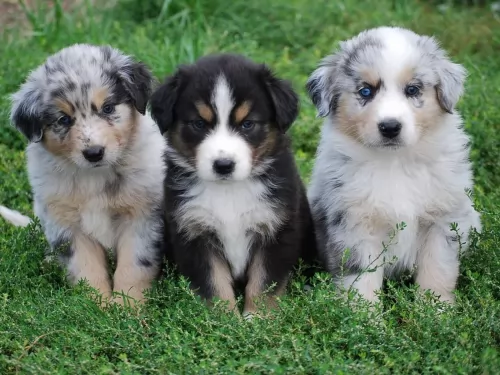 Your Miniature Australian Shepherd can enjoy good health if you make sure he has a nutritious diet, he is well exercised and he is happy and content because of the attention you give him. He can easily reach 13 years of age.
Your Miniature Australian Shepherd can enjoy good health if you make sure he has a nutritious diet, he is well exercised and he is happy and content because of the attention you give him. He can easily reach 13 years of age.
Also, say what you like, human beings constantly tampering with animals to produce certain looks has its drawbacks and can create health problems in dogs.
As a pure breed however, these dogs will be more susceptible to some common canine health problems such as hypothyroidism, patellar luxation, obesity, hip dysplasia, vision problems and cancer.
 The Eurohound is an energetic dog who will require a high-quality nutritious food. Home made dog foods are wonderful but in the event that it isn’t always possible, make sure you buy top quality commercially manufactured food.
The Eurohound is an energetic dog who will require a high-quality nutritious food. Home made dog foods are wonderful but in the event that it isn’t always possible, make sure you buy top quality commercially manufactured food.
Your vet can advise you on the type of food to use for your pet if you are unsure. Certainly, if you feed your dog kibble, take a good look at the ingredient label on the pet food packaging. If you are interested in your dog’s health in terms of food, you will learn about protein/fat ratio and how much moisture is in the food and what vitamins are included.
Remember to occasionally include cooked brown rice, vegetables and chicken as well as some raw meat from time to time.
The Eurohound isn’t a big shedder but you will still need to ensure that you brush his short coat twice a week to keep it in tip top condition.
These are dogs which bond closely with their human family so this grooming period will be therapeutic to him.
Check his ears inside and out for the development of ear infections and brush his teeth twice a week with a special dog toothbrush and tooth paste. Dental disease can cause a host of serious illnesses and you want to avoid this with your dog,
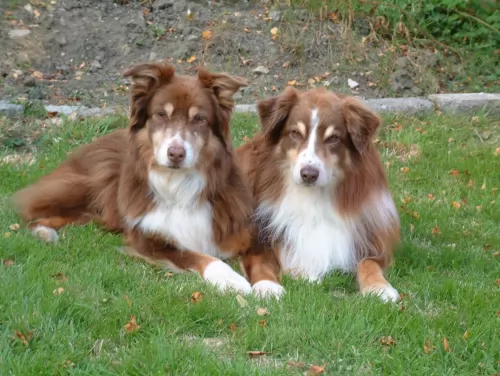 The mini Australian Shepherd has a long coat with seasonal shedding. You will need to give the coat a good brush twice a week to keep it untangled and to remove loose hair.
The mini Australian Shepherd has a long coat with seasonal shedding. You will need to give the coat a good brush twice a week to keep it untangled and to remove loose hair.
Other grooming for your pet will be to check his eyes and ears for infection, check for unusual lumps when you brush him and check for fleas and ticks. Keep his nails trimmed and brush his teeth 2 or 3 times a week to avoid plaque build up.
If you’re wondering how to keep your dog well groomed for the enhancement of this health, people such as your vet or professional groomers will do these grooming tasks for you.
Top quality commercially manufactured dog food packed with vitamins and minerals needs to be your choice if you're going to be using these dog foods. Avoid the cheaper brands that use lots of fillers, sugar, salt, colorants and preservatives.
Home-made food is a wonderful treat for a dog and delicious, nutritious and simple ingredients such as boiled chicken, brown rice or pasta and some cooked vegetables chopped up into his dry kibble from time to time will do him wonders.
Sometimes it will also be good to add in a little bit of raw meat too. Make sure there is a bowl of fresh, cool water available to your pet constantly.